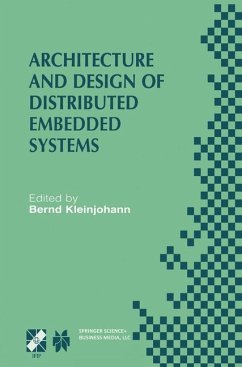
Distributed and Parallel Embedded Systems
IFIP WG10.3/WG10.5 International Workshop on Distributed and Parallel Embedded Systems (DIPES'98) October 5-6, 1998, Schloß Eringerfeld, Germany
Herausgegeben: Rammig, Franz J.

PAYBACK Punkte
76 °P sammeln!
Embedded systems are becoming one of the major driving forces in computer science. Furthermore, it is the impact of embedded information technology that dictates the pace in most engineering domains. Nearly all technical products above a certain level of complexity are not only controlled but increasingly even dominated by their embedded computer systems. Traditionally, such embedded control systems have been implemented in a monolithic, centralized way. Recently, distributed solutions are gaining increasing importance. In this approach, the control task is carried out by a number of controll...
Embedded systems are becoming one of the major driving forces in computer science. Furthermore, it is the impact of embedded information technology that dictates the pace in most engineering domains. Nearly all technical products above a certain level of complexity are not only controlled but increasingly even dominated by their embedded computer systems.
Traditionally, such embedded control systems have been implemented in a monolithic, centralized way. Recently, distributed solutions are gaining increasing importance. In this approach, the control task is carried out by a number of controllers distributed over the entire system and connected by some interconnect network, like fieldbuses. Such a distributed embedded system may consist of a few controllers up to several hundred, as in today's top-range automobiles.
Distribution and parallelism in embedded systems design increase the engineering challenges and require new development methods and tools.
This book is the result of the International Workshop on Distributed and Parallel Embedded Systems (DIPES'98), organized by the International Federation for Information Processing (IFIP) Working Groups 10.3 (Concurrent Systems) and 10.5 (Design and Engineering of Electronic Systems). The workshop took place in October 1998 in Schloss Eringerfeld, near Paderborn, Germany, and the resulting book reflects the most recent points of view of experts from Brazil, Finland, France, Germany, Italy, Portugal, and the USA.
The book is organized in six chapters: `Formalisms for Embedded System Design': IP-based system design and various approaches to multi-language formalisms. `Synthesis from Synchronous/Asynchronous Specification': Synthesis techniques based on Message Sequence Charts (MSC), StateCharts, and Predicate/Transition Nets. `Partitioning and Load-Balancing': Application in simulation models and target systems. <`Verification and Validation': Formal techniques for precise verification and more pragmatic approaches to validation. `Design Environments' for distributed embedded systems and their impact on the industrial state of the art. `Object Oriented Approaches': Impact of OO-techniques on distributed embedded systems. £/LIST£
This volume will be essential reading for computer science researchers and application developers.
Traditionally, such embedded control systems have been implemented in a monolithic, centralized way. Recently, distributed solutions are gaining increasing importance. In this approach, the control task is carried out by a number of controllers distributed over the entire system and connected by some interconnect network, like fieldbuses. Such a distributed embedded system may consist of a few controllers up to several hundred, as in today's top-range automobiles.
Distribution and parallelism in embedded systems design increase the engineering challenges and require new development methods and tools.
This book is the result of the International Workshop on Distributed and Parallel Embedded Systems (DIPES'98), organized by the International Federation for Information Processing (IFIP) Working Groups 10.3 (Concurrent Systems) and 10.5 (Design and Engineering of Electronic Systems). The workshop took place in October 1998 in Schloss Eringerfeld, near Paderborn, Germany, and the resulting book reflects the most recent points of view of experts from Brazil, Finland, France, Germany, Italy, Portugal, and the USA.
The book is organized in six chapters: `Formalisms for Embedded System Design': IP-based system design and various approaches to multi-language formalisms. `Synthesis from Synchronous/Asynchronous Specification': Synthesis techniques based on Message Sequence Charts (MSC), StateCharts, and Predicate/Transition Nets. `Partitioning and Load-Balancing': Application in simulation models and target systems. <`Verification and Validation': Formal techniques for precise verification and more pragmatic approaches to validation. `Design Environments' for distributed embedded systems and their impact on the industrial state of the art. `Object Oriented Approaches': Impact of OO-techniques on distributed embedded systems. £/LIST£
This volume will be essential reading for computer science researchers and application developers.












